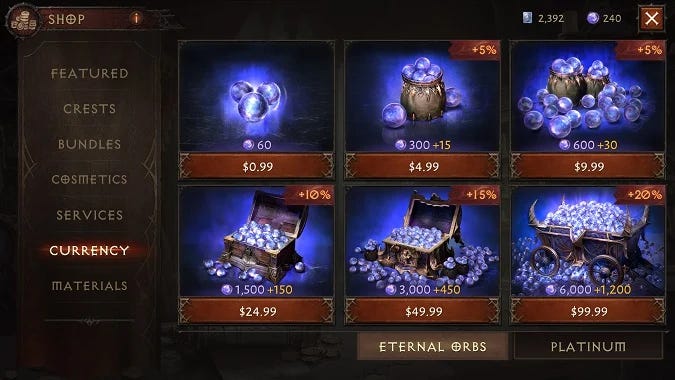What Did I Do To Mobile Game Developers To Make Them Hate Me So Much?
Why are you begging me to play a different game?

So just for fun, I decided to fire up my phone and try a bunch of mobile games, to find out how weird things have gotten with them.
I started out with a game my kids used to play, Dragon Story. Then, whenever it showed me an ad for another game, I tried that game. When that game tried to get me to play a different game, I switched to that game. And so on.
I tried BitLife, Episode, Brawl Stars, Join & Clash, Wheel Scale!, and a bunch of others. Based on estimates at a site I found called SensorTower, all these games are making good or great money. Though SensorTower might just be making up all its figures. Based on the ethical level mobile gaming operates on, that wouldn't surprise me.
I had a little bit of fun and got really irritated on many occasions, and I made some observations you might find amusing, written below.
It's Easy To Complain About Mobile Games, But Don't
When the iPhone App Store opened up, mobile gaming was a little paradise.
For a few bucks you could get all sorts of simple really good games. Angry Birds. Plants vs. Zombies. Doodle Jump. Cut the Rope. Fruit Ninja. All available for a price cheaper than fair, they gave you a pleasant, painless amusement on the subway while making the developers rich.
Then adware took over and micropayments were everywhere, and mobile games sucked for a while.
Now, on Apple devices, you can subscribe to Apple Arcade and get more sweet games than you could ever play for five bucks a month. Google Play Pass has a similar thing going.
So if you go this route, you can get all the fun, ad-free mobile games you could want for the cost of half a cup of coffee (Seattle prices).
Honestly, in terms of value for cash, these services make mobile gaming cheaper than it's ever been! Weirdly cheap. Suspiciously cheap. Nobody should ever seriously complain cheap. "We're going to hike these prices like crazy the moment we get more than a handful of you suckers onboard" cheap. (I don't think they will raise prices, though. The game services are a great loss leader to sell phones.)
But that's not where I wandered. I went to the Wild West, which is where your kids are RIGHT NOW.
My Game Doesn't Want Me To Play It
Mobile games have a lot of ads. When you're lucky, they're little banners at the bottom of the screen where you can easily ignore them. More often, they take over the entire device for a while. Then quit the game to switch you to the app store. Then bring up an X button that looks like it closes the ad, but pressing it shows you another ad.
It's aggravating, but hey, the game is free, so I can't complain too much.
Actually, I can complain. I totally can.
What really bends my brain is that most of the ads they show are for other games. Call me an old-fashioned boomer, but ... If I can get someone to actually play one of my games, the LAST thing I ever want is to try to convince them to play a different game!
Since most of the ads I saw were for other games, it really made me wonder how outside cash is ever entering this ecosystem. Is 90% of the mobile games market just companies paying each other for ads space, circulating one heavily-worn $20 bill back and forth between them while venture capital dollars keeps the whole enterprise from exploding?
Boy, when the next serious recession happens, we’re sure going to find out.
The way mobile games normally make money is to get a bunch of people addicted to them. Then a tiny percentage of the players (called "whales") are compulsives who spend a fortune on getting all the ultragems or ponyberries or whatever your made-up currency is.
For this to work, you need a bunch of people addicted to your game. How can that happen, though, when all the ads make your game insanely annoying to play?
I know I'm not the first to think this industry is weird. But it's weird.

The Rest Of The Ads Are For Gambling
Ads for apps that let you gamble with real money. Ads for crypto, which is just mega-gambling that you pretend is investing. (JOKING! DON'T YELL AT ME CRYPTO PEOPLE! Your system is working GREAT!)
While gambling can be exciting and fun, it is also a vice. You will lose money, and some people get compulsive about it with massively destructive results. I don't think kids should be getting ads for it.
I was honestly surprised to see gambling ads in my kid's cutesy dragon raising game. What that means, of course, is that I am painfully naive and insufficiently cynical. If I've gotten to this point with any positive expectations for mobile apps, there is no hope for me in this cruel world.
The Apple App Store used to be really carefully curated. When I first started selling games on iOS, I had to get my games through a careful inspection and usually have to make multiple changes. That sort of curation is expensive and now a thing of the past.
I Was Wrong About In-Game Purchases
Since I've been writing about games for 30 years or so, I have had many opportunities to be wrong about things.
Mobile games with in-app purchases depend on a tiny percentage of whales who spend huge amounts of money. These games are functionally low-level gambling that looks for compulsives and addicts to bleed dry.
I used to think this is completely moral. Now I'm not so sure.
Some people are compulsive. They get addicted to gambling. They gamble until their lives are in ruins. It is so easy and cheap to say, "Well, they shouldn't do that!" But for some people, that doesn't work. They know they are destroying their lives, but their brains are cracked. Their inability to stop is compulsive. That is what "compulsive" MEANS.
One of the main purposes of government is to prevent the strong from abusing the weak and vulnerable. This should still apply if the vulnerability is mental.
I am very glad I don't make my living exploiting people with cracks in their brains.
Yet, I can't advocate for doing anything about it. It's one thing to think something is wrong. It's another thing entirely to pass a law.
Magic: The Gathering or Pokemon cards (which are worth real money, sometimes quite a lot) are low-stakes gambling aimed at children, but nobody is calling for a law to ban them, because there's no way to write such a law.
And honestly? If you really want to do some good? If you really want to protect people then have your state shut down its lottery and remove the dozen ads for it in every supermarket. When our government is absolutely dependent on leeching money out of the foolish, compulsive, and bad-at-math, you can bet they will only ever give us more gambling.
Evony Still Exists
By the way, remember that pretty standard fantasy wargame called Evony that built its fanbase with the horniest, most boob-heavy ads in the industry?
It's still totally around, but its web page now leads off with Abraham Lincoln.
I miss the old ads. They were sleazy, but they were so honest they attained a weird sort of purity.
Even With All My Complaining, Mobile Games Are Still A Great Deal
I found a lot of sketchy stuff in my poking around, but I did have to dig. The most popular games are the most popular for a reason: They give fantastic value.
You can get a lot of fun from Pokemon Go, Clash of Clans, Fortnite, PUBG Mobile, Among Us!, Clash Royale, or a host of others without paying a penny. Sometimes you might want to spend a bit, but it's really not necessary.
And again, the subscription services are really cheap. For the moment.
So it's fun to feel all morally superior about the whales and get angry about the ads. But the story here is, in the end, the same as everywhere else in the games industry. There is an enormous amount of quality competition which has driven the price of games to near-zero. If you want to break in here, you'd better have a seriously amazing game.
So, in the end, mobile gaming is the same as everything else.
We have announced our next game, Queen’s Wish 2: The Conqueror, an all-new, innovative, Empire-building indie RPG, coming in August. Wishlist it to be told when it is released!




So, a few notes about ads circle-jerk.
1) Some of games being advertised actually belong to the same publisher, so if you go from one game to another and spend money there instead of here, you still pay the same people. This is called ecosystem, and it only works for big players, obviously - you have to have a certain number of games on the market, and be willing to shell out money for ads for all of them.
A guess: this might work in part because a lot of mobile gamers don't do a lot of research before picking a game to play. But they might not like it enough to buy in-apps, because this particular genre, or setting doesn't tickle them quite right... But here comes the ad! For another game! If you can out-spend other bidders, you can lock the hapless player in a loop of your titles, going from one to another until he/she finds something to bite and become a whale.
2) Mobile games often are designed to have quite short play sessions - 5-10-15 minutes - until your "energy" runs out, or you have to wait for your army to regenerate, or whatever. This is done on purpose, both to avoid getting the player tired from actually very boring and repetitive gameplay, and also to leech money from those who REALLY want to go on playing RIGHT NOW (addicts). But, what if the player reached his limit of play in one game, and isn't ready to pay to continue... But he wants to play SOMETHING. So, show him an ad for another game. It might not even necessary be a game from your ecosystem - it will still feature the same short play session time, after which he might come back to check your game (or your other game, etc.) - just don't let him put that phone down and forget about it (and pester him with pop-up notifications, of course).
I worked for some time in mobile gamedev (for two unsuccessful small companies and one somewhat successful big one that mostly made money on gambling games and lost it on any other project), and let me tell you - I hate everything about this part of industry and wish it, and its approach to game design and monetization to crash and burn (which will not happen, which is why this is a wish, and not a plan).
I think it is important to remember, as much as us old gamers might find it baffling, the mobile market is many times the size of the traditional PC gaming market. $5 per sale in the mobile game industry is like $15 for the small niche market of PC gaming. The secret sauce of mobile gaming was never micro transactions, it is the 6 billions owners of mobile devises.